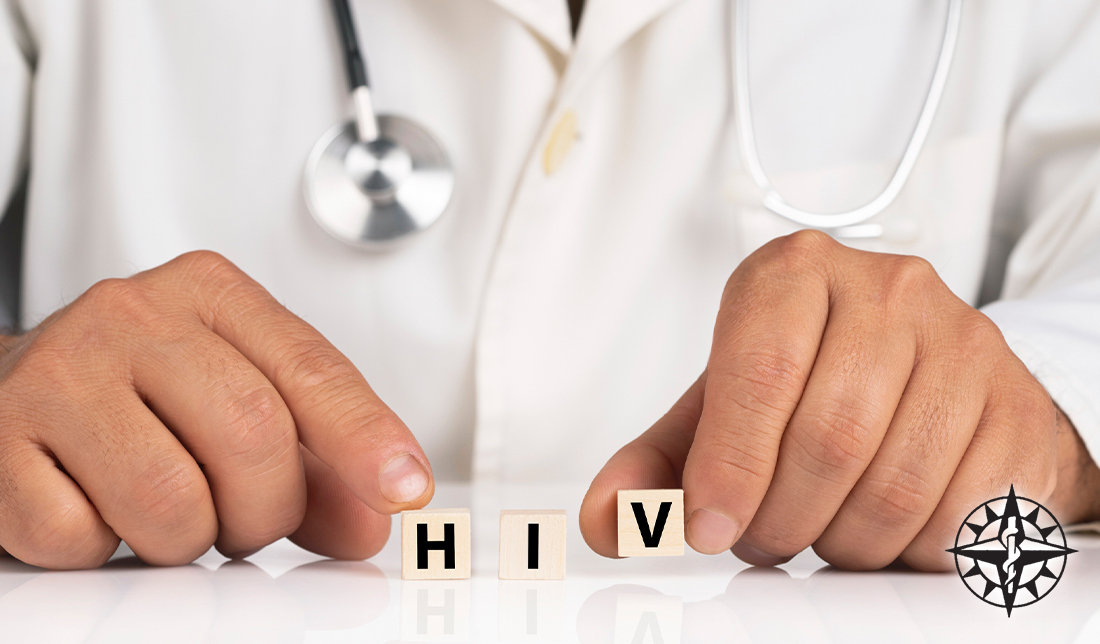Published on: April 22, 2024
In a world where HIV/AIDS continues to affect millions, being aware of the signs and symptoms can make all the difference. Join IDATB as we shed light on this critical topic!
Recognizing the signs and symptoms of HIV is not just about staying informed. It’s about empowering our communities to be proactive in their decisions and tackle the stigma surrounding HIV.
Since many symptoms of HIV can be symptoms of other diseases, it is imperative to get regular HIV testing, especially if you have been engaging in unprotected sex or sharing needles. Knowing your HIV status can then help guide you to the proper prevention and treatment plan for you and your partners. Early detection saves lives and prevents future HIV transmissions!
Let’s take a look at some of the common signs and symptoms of HIV and when one should seek medical attention.
Understanding HIV
Human immunodeficiency virus, HIV, is a sexually transmitted infection (STI) that attacks and weakens the immune system. It can spread via contact with certain bodily fluids of a person with HIV, such as through unprotected sex, blood contact, pregnancy, or breastfeeding. If left untreated, advanced HIV can progress into AIDS (acquired immunodeficiency syndrome).
HIV has no cure, so once a person contracts HIV, they have it for life. Fortunately, while there is no cure for HIV/AIDS, medications can help keep the infection under control and prevent the virus from multiplying in the body. Antiviral treatments have significantly reduced AIDS-related deaths worldwide. By understanding the signs and symptoms of HIV, we can continue to prevent and treat HIV/AIDS within our community.
Common Signs and Symptoms
Knowing what to look for in an HIV infection can be a matter of life and death. Early detection and treatment can save your life. Today, we have access to highly effective treatment and medication options, making it entirely possible to live a long and healthy life with HIV thanks to these modern advancements.
If you suspect you may have been infected with HIV or are at risk of contracting the virus, it’s crucial to seek medical attention as soon as possible. Once HIV has severely compromised your immune system, you become vulnerable to diseases that a healthy body could normally fight off.
Now, let’s look at the three stages of an HIV infection and examine the common signs and symptoms associated with each stage.
-
Acute HIV Infection (Stage 1)
Within 2 to 4 weeks of becoming infected with HIV, a person may begin experiencing symptoms of acute HIV. These symptoms are often mistaken for the flu or other viral illnesses due to their similar presentation.
Some of the most common symptoms include:
- Fever and fatigue
- Swollen lymph nodes
- Headache
- Sore throat
- Mouth sores
- Night sweats
- Diarrhea
Stage 1 can last from a few days to several weeks, but not everyone will experience symptoms. Some people may be asymptomatic or experience mild symptoms that might not alert them. However, because the amount of virus in the bloodstream is high, the risk of spreading the infection to others is increased during this stage. Since symptoms can be mild or even absent during Stage 1, many people may not be aware that they are infected. This lack of awareness is how Stage 1 progresses over a few weeks to months into Stage 2.
-
Clinical Latency (Stage 2)
After Stage 1 has run its course, the body enters into an asymptomatic period known as chronic HIV infection. The virus continues to multiply throughout the body during this stage however individuals may not feel sick or exhibit any symptoms.
Stage 2 can last 10 to 15 years for some individuals, while others may progress more rapidly. With proper treatment taking prescribed antiretroviral therapy (ART), people living with HIV can achieve an undetectable viral load, allowing them to live a healthy life without the concern of transmitting HIV to their partners.
For those who don’t get treatment, the virus can destroy CD4 T-cells, impairing their immune system and making them susceptible to infections and other long-term symptoms.
-
AIDS (Stage 3)
The most advanced stage of HIV is when it progresses to AIDS (acquired immunodeficiency syndrome). While antiviral treatments have significantly reduced deaths from AIDS, untreated HIV will typically progress to AIDS within 8 to 10 years.
The immune system can face significant damage during this stage, with CD4 T-cell levels dropping below 200. Individuals are more susceptible to developing opportunistic infections or cancers, further weakening, and compromising the immune system. People living with AIDS who do not receive medication may survive for only 2 to 3 years or less, depending on whether they contract another infection.
For those who were unaware of their HIV infection, AIDS symptoms may look like:
- Night sweats
- Chills
- Swollen lymph nodes in the neck or groin region
- Persistent fevers
- Long-lasting diarrhea
- Yeast infections
- Constant fatigue
- Weight loss
- Red, brown, pink, or purple-colored sores on the skin or inside the mouth
- Pneumonia
Starting treatment early can prevent the progression to AIDS. Fortunately, despite the life-threatening nature of AIDS, HIV can still be treated at this stage. Regardless of the CD4 T-cell count, anyone with an HIV infection should be taking antiviral medicine.
Less Common Signs and Symptoms
HIV signs and symptoms can vary depending on the individual and viral load, so it is possible to experience less common symptoms. From neurological symptoms to gastrointestinal and psychological symptoms, each of these may indicate an HIV or AIDS diagnosis. While many of these symptoms can also be signs of other diseases or illnesses, it is always advisable to take note of them and consult your primary healthcare provider for further information.
Neurological Symptoms
Neurological symptoms can be a result of not only the damage caused by HIV itself but also from other opportunistic illnesses and cancers associated with HIV and AIDS. These complications typically occur in the advanced stages of HIV, such as AIDS—nearly half of adults with AIDS experience neurological complications related to HIV.
Some of these symptoms may include:
- Headaches
- Cognitive impairment
- Peripheral neuropathy
- Dementia
- Vacuolar myelopathy
Gastrointestinal Symptoms
Gastrointestinal symptoms associated with HIV can affect the entire GI tract, from the mouth to the rectum. While these symptoms may not typically be the initial sign of HIV for patients, almost all individuals with HIV and AIDS experience some form of gastrointestinal symptoms throughout their illness. These symptoms can result from opportunistic infections, medication side effects, or the immunosuppressed state of the body.
Some of these symptoms may include:
- Diarrhea
- Nausea and vomiting
- Weight loss
- Dysphagia
- Odynophagia
Psychological Symptoms
Living with HIV/AIDS can seriously impact a person’s mental health. The stress accompanying a diagnosis, feelings of isolation, and side effects of medication can lead many individuals down a challenging path. Fortunately, the mental disorders associated with HIV/AIDS can be treated.
Some of these symptoms may include:
- Depression
- Anxiety
- Memory loss
When to Seek Medical Attention
Rather than waiting for signs and symptoms of HIV to appear, you should be getting tested for HIV regularly. Immediate testing is crucial If you suspect you have had exposure to HIV.
Regular testing is the most effective way to ensure you are free from HIV/AIDS. If you or your partner are living with HIV, it’s important to take the necessary precautions with treatment options and prevention strategies to ensure the safety of both partners.
Regular visits to your doctor for HIV/AIDS-related medical advice are essential. They can provide you with the appropriate prevention and treatment plans. Additionally, they can offer the necessary resources and support for testing. If you are experiencing persistent symptoms like those discussed today, do not hesitate to schedule testing to determine your status. Knowing your HIV status can help protect both yourself and your partners!
For convenient HIV/AIDS testing in Tampa Bay, consider checking out Infectious Disease Associates of Tampa Bay.
HIV Testing in Tampa | IDATB
Key points to remember:
- HIV infection progresses through 3 stages.
- While HIV is not curable, it is treatable.
- Early detection of HIV can save lives.
- Recognizing the signs and symptoms of HIV is crucial for accessing treatment and prevention options.
- For HIV/AIDS testing in Tampa Bay, visit IDATB.
At IDATB, we are a group of consulting physicians who specialize in the diagnosis and treatment of infectious and tropical diseases. With over 30 years of HIV / AIDS treatment experience and an in-house lab, IDATB has the resources and knowledge to best treat HIV / AIDS patients. Our physicians are available twenty-four hours a day to provide care for the Tampa Bay community. It is our privilege to care for you!
If you believe you are at risk for contracting HIV, are HIV-positive, or need someone to talk to about your concerns, do not hesitate to call (813) 251-8444 or review our services at https://idatb.com/services/.
Resources:
- https://www.pennmedicine.org/for-patients-and-visitors/patient-information/conditions-treated-a-to-z/aids-and-hiv
- https://www.webmd.com/hiv-aids/understanding-aids-hiv-symptoms
- https://www.mayoclinic.org/diseases-conditions/hiv-aids/symptoms-causes/syc-20373524
- https://www.hiv.gov/hiv-basics/overview/about-hiv-and-aids/what-are-hiv-and-aids
- https://idatb.com/hiv-tampa/
- https://www.hopkinsmedicine.org/health/conditions-and-diseases/hiv-and-aids/neurological-complications-of-hiv
- https://www.ncbi.nlm.nih.gov/pmc/articles/PMC7173545/
- https://www.nimh.nih.gov/health/topics/hiv-aids#:~:text=People%20with%20HIV%20have%20a,faced%20by%20people%20with%20HIV





